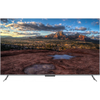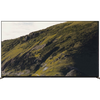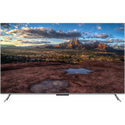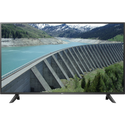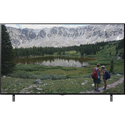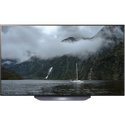A comparison of specs, key information, reviews, and best pricing from top retailers
Last updated -- hours ago | Report incorrect information
What we think

The PerfectRec TV team Learn more
Updated January 10, 2024·
If you want a quality TV without spending too much, the Amazon Omni QLED is less expensive than the Sony X95K. The Amazon TV is decent for movies and very good for animation, but it isn't as bright and may not perform as well in a very sunny room. It also has lower gaming performance. In contrast, the Sony X95K costs more, but offers better overall picture and sound quality, has better performance for sports, and is better suited for gaming with its higher responsiveness. It also handles bright rooms well. Choose the Sony if these features are worth the higher price to you. Give Feedback
this description is based on the product variant with some specs and product variant with some specs. At the time of writing, the variant with some specs cost some dollars and the variant with some specs cost some dollars.
Advantages of the Amazon Omni QLED (LCD)
- The Amazon Omni QLED (LCD) has no clear advantages over the Sony X95K (LCD).
Advantages of the Sony X95K (LCD)
- Best in class for bright room
- Very good for dark room
- Very good for gaming
- Very good for movies & TV
- Very good for sports
- Excellent for news, talk, & other TV
- Good for use as monitor
- Best in class for upscaling
- Best in class motion processing
- Very good reflections
Key differences
Sports
6.0
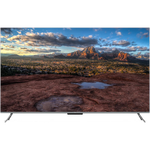
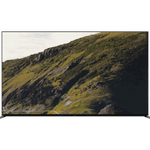
8.0
3.2/10
MOTION PROCESSING
10.0/10
60Hz
REFRESH RATE
120Hz
8.0/10
INPUT LAG SCORE
7.0/10
6.6/10
UPSCALING
10.0/10
7.6/10
SDR BRIGHTNESS SCORE
9.1/10
Yes
HLG SUPPORT
Yes
The Sony X95K (LCD) is very good for sports, while the Amazon Omni QLED (LCD) is only fair.
The Sony X95K excels in sports viewing with superior motion processing and faster response time, ensuring clearer fast-moving scenes, while it also manages reflections better, offering a clear picture in bright rooms. In contrast, the Amazon Omni QLED's performance in these aspects is fair, resulting in less clarity during fast sports action and more difficulty with reflections, although both TVs may show some limitations at wide viewing angles and uniformity in gray scenes.
Gaming
6.4


8.2
6.1/10
RESPONSE TIME SCORE
8.0/10
8.0/10
INPUT LAG SCORE
7.0/10
3.2/10
MOTION PROCESSING
10.0/10
75.0/100
GAMING LOCAL DIMMING
85.0/100
6.5/10
GAME HDR BRIGHTNESS SCORE
9.1/10
The Sony X95K (LCD) is very good for gaming, while the Amazon Omni QLED (LCD) is only fair.
News, Talk, & Other TV
7.7


9.1
7.6/10
SDR BRIGHTNESS SCORE
9.1/10
6.6/10
UPSCALING
10.0/10
The Sony X95K (LCD) is excellent for news, talk, & other TV, while the Amazon Omni QLED (LCD) is good.
The Sony X95K is favored for SDR brightness, ensuring clearer visibility in bright rooms, and has excellent upscaling, making lower resolution content appear more refined, which is crucial for news and talk shows. The Amazon Omni QLED, while offering good SDR brightness and upscaling, might not match the Sony in these crucial areas, but it's still a solid choice for standard television programming.
Bright Room
6.9


9.5
5.3/10
VIEWING ANGLE
6.0/10
7.6/10
SDR BRIGHTNESS SCORE
9.1/10
6.3/10
HDR BRIGHTNESS SCORE
9.1/10
6.0/10
REFLECTIONS SCORE
8.4/10
The Sony X95K (LCD) is best in class for bright room, while the Amazon Omni QLED (LCD) is only fair.
The Sony X95K excels in both SDR and HDR brightness, which helps maintain picture quality in a bright room, and it has very good reflection handling to reduce glare. In comparison, the Amazon Omni QLED provides less brightness for both SDR and HDR content and fair reflection handling, which may lessen the viewing experience in well-lit conditions.
Cost
$600


$1,788
$0
$500
$1,000
$1,500
$2,000
$2,500
$3,000
The Amazon Omni QLED (LCD) has a price of $600 and the Sony X95K (LCD) costs $1,788.
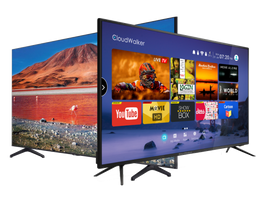
Let Us Help Find Your Perfect TV
Find your new TV
Key similarities
Picture Quality
7.7


8.0
9.07/10
CONTRAST
7.50/10
8.2/10
COLOR VOLUME SCORE
7.8/10
LED FALD
PANEL TYPE
LED FALD
VA
PANEL SUB-TYPE
VA
Although they have very similar scores, PerfectRec considers Sony X95K (LCD) to have very good picture quality, while the Amazon Omni QLED (LCD) has good picture quality.
Movies & TV
7.8


8.0
9.07/10
CONTRAST
7.50/10
6.5/10
BLACK UNIFORMITY
6.1/10
6.6/10
UPSCALING
10.0/10
Yes
HDR10 SUPPORT
Yes
Yes
HDR10+ SUPPORT
No
Yes
DOLBY VISION SUPPORT
Yes
Although they have very similar scores, PerfectRec considers Sony X95K (LCD) to be very good for movies & TV, while the Amazon Omni QLED (LCD) is good.
The Amazon Omni QLED enhances movie and cinematic TV watching mainly due to its high contrast and solid black uniformity, offering deep blacks and distinct shadow detail. In contrast, the Sony X95K excels with its superior local dimming, color accuracy out of the box, and a wider color volume, resulting in more vibrant and true-to-life pictures.
Cartoons & Animation
8.3


8.7
8.0/10
COLOR GAMUT SCORE
7.7/10
8.2/10
COLOR VOLUME SCORE
7.8/10
7.6/10
SDR BRIGHTNESS SCORE
9.1/10
7.6/10
COLORS OUT OF THE BOX SCORE
8.5/10
7.0/10
GRAY UNIFORMITY
8.0/10
The Sony X95K (LCD) and Amazon Omni QLED (LCD) are both very good for cartoons & animation.
The Amazon Omni QLED excels in colors right out of the box, offering vibrant hues with a very good color gamut, making cartoons and animation pop without the need for calibration. On the other hand, the Sony X95K also presents colors very well from the start and provides good scores in both color gamut and color volume, ensuring cartoons and animations look true to life with consistent bright and dark colors.
Give feedback
We’re constantly working to improve.
How the Amazon Omni QLED (LCD) and the Sony X95K (LCD) compare to other TVs
Spec Comparison
| Amazon Omni QLED (LCD) | Sony X95K (LCD) |
GENERAL | |||
|---|---|---|---|
| Price | |||
$600 | $1,788 | ||
Brand | |||
Brand | Amazon | Sony | |
Release Date | |||
Release Date | September 1, 2022 | May 3, 2022 | |
Full name | |||
Full name | QL65F601 | XR-65X95K | |
Screen Size | |||
Screen Size | 65" | 65" | |
Screen Resolution | |||
Screen Resolution | 4K | 4K | |
TV FEATURES | |||
|---|---|---|---|
Operating System | |||
Operating System | Fire OS | Android TV | |
Sound Quality Score | |||
Sound Quality Score | 9.2/10 | 9.5/10 | |
NextGen Ready | |||
NextGen Ready | No | Yes | |
HDMI Ports | |||
HDMI Ports | 4 | 4 | |
Coax Ports | |||
Coax Ports | 1 | 1 | |
DISPLAY QUALITY SCORES | |||
|---|---|---|---|
Picture Quality Score | |||
Picture Quality Score | 7.8/10 | 8/10 | |
Bright Room Score | |||
Bright Room Score | 6.9/10 | 9.6/10 | |
Gaming Score | |||
Gaming Score | 6.4/10 | 8.2/10 | |
Movies & TV Score | |||
Movies & TV Score | 7.8/10 | 8/10 | |
Sports Score | |||
Sports Score | 6.1/10 | 8/10 | |
PHYSICAL | |||
|---|---|---|---|
Dimensions w/o Stand (H x W x D) | |||
Dimensions w/o Stand (H x W x D) | 33.4" x 57.1" x 3.2" | 32.9" x 56.9" x 2.4" | |
Dimensions with Stand (H x W) | |||
Dimensions with Stand (H x W) | Unknown" x Unknown" | 33.4" x 56.9" | |
Weight without Stand | |||
Weight without Stand | 45.4 lbs | 70.8 lbs | |
VESA Mount | |||
VESA Mount | 400 x 300 | 300 x 300 | |
DISPLAY | |||
|---|---|---|---|
Color Depth | |||
Color Depth | 10 bit | 10 bit | |
Black Frame Insertion | |||
Black Frame Insertion | Yes | Yes | |
Auto Low Latency Mode | |||
Auto Low Latency Mode | Yes | Yes | |
Contrast | |||
Contrast | 9.1/10 | 7.5/10 | |
Local Dimming | |||
Local Dimming | 6.3/10 | 8.4/10 | |
SOUND | |||
|---|---|---|---|
Speaker Setup | |||
Speaker Setup | 2.0 | 4.2 | |
Speaker Power | |||
Speaker Power | 24 W | 60 W | |
Dolby Atmos | |||
Dolby Atmos | Yes | Yes | |
DTS:X | |||
DTS:X | No | Up to DTS Digital Surround, Bypass only | |
Shopping
Amazon Omni QLED (LCD)
See more
Dig into reviews and images
Tech Advisor
Jim Martin | April 2023
"This really is a TV designed for the streaming generation ... And it’s good to see support for both HDR10+ and Dolby Vision because it means more of the content you stream will be available in HDR. Overall, the Omni QLED is an impressive TV. It’s pretty bright, has good contrast and – thanks to those quantum dots – vibrant colours."
Get a great deal on the Amazon Omni QLED (LCD) or the Sony X95K (LCD)
About Amazon
Amazon, the largest online retailer in North America, has forged partnerships with TCL and Hisense to produce white-label TVs incorporating their Fire OS software. These Amazon-branded TVs typically compete in the low-end and mid-range segments, offering compelling price points. Leveraging their strong reputation, Amazon has swiftly built brand trust in the TV market despite being relatively new to it. To enhance their popularity, these TVs integrate features from the Amazon ecosystem, including Alexa, providing users with a seamless and interconnected TV experience.
About Sony
Sony stands as a highly experienced and widely trusted TV manufacturer, earning a reputation that surpasses all others. A Japanese company, Sony has been making TVs for far longs than it has been making Playstation game consoles. Sony's high-end TVs are often regarded as the ultimate choice for videophiles, representing the epitome of quality, albeit at a premium price point. Renowned for their advanced and precise motion handling, as well as their cutting-edge local dimming algorithms, Sony consistently delivers unparalleled performance in these areas. They include Google TV software with all their TV sets, which grants access to the largest selection of apps available and they also include Bravia Core which is a movie streaming platform specifically for Sony TVs that offers higher picture quality by using more bandwidth.
Give feedback
We're constantly perfecting our model
TV guides you might be interested in
More comparisons for you
FAQs
FAQs about TVs
Why trust us
This information was produced and vetted by the PerfectRec TVs team. We are a product research and recommendation organization that meticulously reviews and evaluates the latest TV information and makes it digestible for you.
By the numbers
385
TVs evaluated
33,110
TVs stats compiled
21
Proprietary TVs ratings developed
165,330
Recommendations made
24,800
Consumer hours saved
About the TV team
Joe Golden, Ph.D
CEO and TVs Editor
Joe is an entrepreneur and lifelong electronics enthusiast with a Ph.D in Economics from the University of Michigan.
Jason Lew
Staff Expert & Software Engineer
Jason is a staff expert and software engineer that has been making laptop recommendations for 7 years and moderates one of the largest laptop subreddits.
Chandradeep Chowdhury
Staff Expert & Software Engineer
Chandradeep is a staff expert and software engineer and expert in televisions and monitors. He’s been making monitor recommendations for ten years.
Jaime Roldán
TVs Expert
Jaime is a Colombia-based TV expert. He is an electronics engineer with 8 years of experience in the telecom sector and has been making TV recommendations for 12 years.
